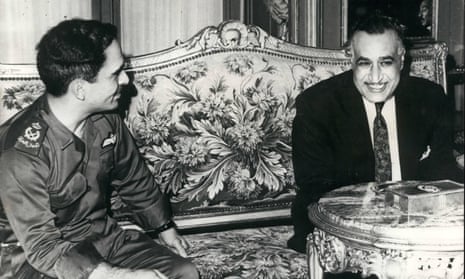Cairo, May 30
King Hussein of Jordan arrived here unexpectedly at 11 this morning – and five hours later, in front of international television cameras, signed a defence agreement with President Nasser.
Under this five-year pact each country will consider an attack on the other as an attack on itself. The Egyptian Commander-in-Chief will command any joint operations. In speeches after the signing ceremony President Nasser calling King Hussein “dear brother,” thanked him for the idea.” We have had difficulties in the past,” he said, “but we are together in this crisis. The world would be astonished at the pact.”
King Hussein said that Jordan was hand and heart with Egypt and he thanked “brother Nasser” for all he had achieved so far. Significantly, there was no mention of Syria, with whom Jordan broke relations last week, nor of Iraq.
Jordan’s sudden coming into line with the majority of Arab countries represents another feather in Colonel Nasser’s cap, as it means that King Hussein realises he can no longer afford to keep off the bandwagon. The King’s motive is not only an attempt to retain his own position against mounting pressures against him, but most likely to extract assurances from Colonel Nasser that no unprovoked action will be taken against Israel.
During the morning talks the head of the Palestine Liberation Organisation, Mr Shukeiry, was called in suggesting that King Hussein was insisting on a pledge that Mr Shukeiry would control Palestinians in Jordan – and, in fact, Mr Shukeiry flew back with King Hussein to Amman.
Only last week Mr Shukeiry was calling on Palestinians to overthrow the “puppet King” and Colonel Nasser was condemning the Prime Minister of Jordan as an “imperialist spy.” While Mr Shukeiry may agree to cease such propaganda and to control refugees he has no control over Syrian refugee organisations financed privately from Kuwait.
Meanwhile, “Al Ahram’s” report today that a United States tanker flying the Liberian flag turned back from the Strait of Tiran yesterday after a warning shot had been fired across her bows, could not be confirmed by other sources. The United States Embassy here repeats the Washington disclaimer of all knowledge of such a ship in the area. The “Al Ahram” report states that the tanker refused to obey light signals and a shore battery opened fire.
Observers here predict that Egypt will refuse to consider the reported United States–British plan calling for an international maritime conference to settle the Gulf of Aqaba issue while Egypt allows all non-Israeli shipping through. Agreement would be a climbdown and, with Soviet support now assured, President Nasser feels strong enough to reject all compromises.
Egyptian pressure is now being mounted against King Idris of Libya to close the United States airbase at Wheelus. Today there were renewed accusations that the base is being used to supply Israel. Nationalist elements were called on to bring pressure on the Libyan Government.
A contingent of Kuwaiti troops has arrived here and will be stationed at Sharm el Sheik on the Gulf of Aqaba along with other foreign contingents as a symbol of Arab solidarity. Any attack against this outpost will automatically involve directly the contingents’ countries.
